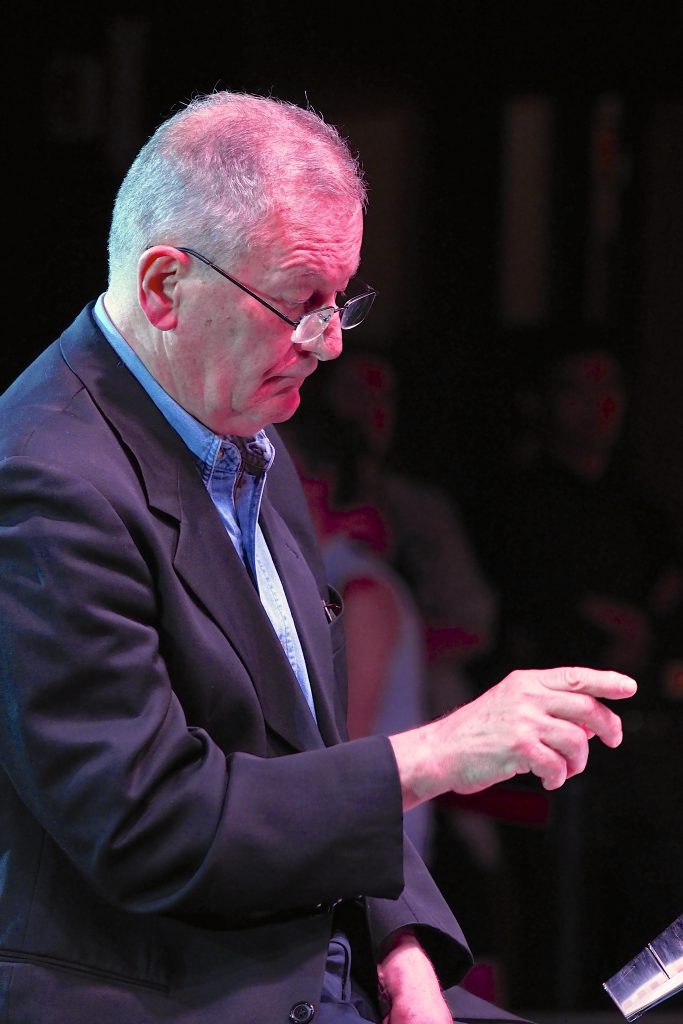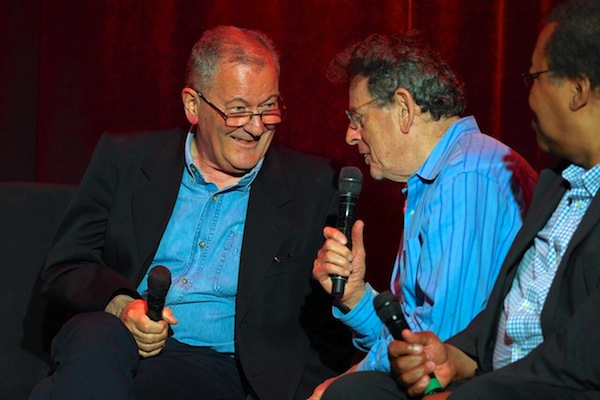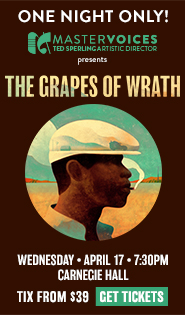Petr Kotik marks 75th birthday with friends and their music

Petr Kotik conducted the S.E.M. Ensemble Wednesday night at (le) poisson rouge. Photo: Michael Yu
Petr Kotik sat on the stage at (le) poisson rouge Wednesday night, talking with colleagues Philip Glass, Alex Mincek, and George Lewis, speaking about how the old ways of music were returning. What he meant was the seamless career of the composer who played music and produced concerts, like Mozart.
The nineteenth century saw the elevation of the composer and the subsequent separation from the nitty-gritty of music making, but now, early in the 20th century, performing composers who also put in the administrative and logistical work to present concerts are everywhere.
Kotik is a preeminent figure in modern and contemporary music, a composer who follows the old ways by playing the flute, conducting, producing concerts, and even adjusting the mic stands.
Wednesday night’s concert, “Nothing/Everything Changes,” was a birthday celebration (he turned 75 in January), and a way to honor Kotik’s accomplishments, which are so considerable that the event could in no way do them justice (even with an early screening of a documentary film on his work).
Kotik, musicians from his New York based S.E.M. Ensemble, and the Momenta Quartet played some of his finest compositions, alongside music from colleagues: Glass, Mincek and George Lewis.
Those three composer-musicians joined Kotik on stage, along with regular collaborator, violinist Pauline Kim Harris, for amiable conversations about the pieces and shared memories. The mood was warm, perhaps a little loose, but the music making was serious.
The notable oboist Jacqueline Leclair played Kotik’s 1962 solo Etude 7. This was an interesting study in intervals, with Leclair nailing wide leaps from the instrument’s middle to altissimo registers. A well-formed piece, made with a precise balance of repeated ideas and phrases, it was fascinating to hear Kotik’s not yet fully-formed voice.
That voice, as heard through There is Singularly Nothing, excerpts from his monumental Many Many Women—two vocal settings of Gertrude Stein—and his excellent String Quartet No. 2, “Torso,” uses much more prominent repetitions to create a lapidary, mysterious beauty.
History and inclination put Kotik at a unique pivot. As a performer he has long been a champion of John Cage and Morton Feldman, and while still in Czechoslovakia in the 1960s he developed contacts with those composers and the seemingly incompatible figures Cornelius Cardew and La Monte Young. With these examples and through his own artistic values, he came to a unique style of minimalism; repeated extended units with roots in plainchant that cycle together to form unusual harmonies.
The quartet of Kotik, trombonist William Lang, soprano Kamala Sankaram, and baritone Jeffrey Gavett played There is Singularly Nothing, then doubled those parts for the Many Many Women excerpts. Combined with Stein’s cool, objective prose, Kotik’s sinuous phrases came together Wednesday in an aesthetic like curved obsidian; dark and compelling, pleasingly smooth.

Petr Kotik, Philip Glass and George Lewis. Photo: Michael Yu.
Glass’s own early, revolutionary minimalism was heard via Two Pages, one of his finest early works. Before it began, Glass spoke glowingly of what he heard during rehearsal, but the performance was spiked with agonizing problems. Kotik directed an electric organ and two violinists, and several times the latter missed a beat, which in this piece is like stepping out of a moving car—you abandon trying to catch up, and struggle to find a safe point to climb back in.
Lewis and Mincek brought their instruments—trombone and tenor sax—and played an improvisation using Lewis’ interactive computer system. The computer listened to the players and responded avidly, through a disklavier piano, sounding something like a ruminative Cecil Taylor against Lewis’ post-be bop phrases and Mincek’s stabbing long tones and timbres. The trombonist has been refining this system for decades, and it now produces impressive results that are often beautiful and always deeply musical. The only problem, as Lewis pointed out, is the computer doesn’t know when to stop, so he turned it off himself.
Momenta finished off the performances with a sharp performance of “Torso.” Both a distillation of Kotik’s ideas and a step forward, the piece alternates between slow, quiet chorales (played in early music style) that swing back and forth between consonance and dissonance, and fast, aggressive streams of repeated notes and phrases. The two ideas eventually start to bleed into each other, making for an argument that hints at some future resolution.
Discussed on stage and in the documentary, were Kotik’s endeavors in putting all sorts of music in front of the public. He formed the European counterpart of the S.E.M. Ensemble, Ostravska Banda, in 2005; founded (along with Alvin Lucier and Christian Wolff) the biannual Ostrava Days institute and festival of modern and contemporary music, and followed that in 2012 with an alternating new opera festival. As a conductor, he has taken the regional Janacek Philharmonic Orchestra and coached them in producing masterful performances of music from Cage, Feldman, and other titans of the 20th century avant-garde. The musical world is a richer place because of Petr Kotik.



